When I first contacted Pawo Choyning Dorji about two months ago, “Lunana: A Yak in the Classroom” – his directorial debut had been shortlisted for the Best International Feature in the 94th Academy Awards. He told me he did not expect the film could go this far to the Oscars. But, sometimes the most unexpected thing happens when you least expect it. Lunana was not only on the shortlist, it successfully made it through to the top five finalists.
Pawo strikes me as the most humble, talented and down to earth person. A couple of days into the interview process, he started to get swamped with an avalanche of media engagements. Despite his increasingly hectic schedule, he graciously took the time to answer my questions with words laced with fervor, humility and wisdom.
Q1. Congratulations to Lunana: A Yak in the Classroom for being nominated as one of the Oscars Best International Feature Films . Lunana has already won several international awards before the Oscars. How do you feel about all the accomplishments that the film has made?
The whole journey has been very surreal, and it is probably one of the most improbable things to happen in my lifetime. I am aware that for filmmakers, an Oscar nomination is the crowning achievement of a lifetime of dedication, hard work and personal sacrifices. I am humbled to be an Oscar nominee with my first film. This inspires me to work even harder to share the stories of Bhutan with the rest of the world.
Just the production of the film was one of the most logistically challenging initiatives all of us undertook. When I first proposed the idea of making a film in the Lunana valley, which is one of the most remote isolated human settlements in the world, everyone thought it would be impossible that we shouldn’t even attempt it.
Lunana is about a 10-day trek through some of the highest mountains in the world. It is totally cut off from civilization. Even to this day, the settlement miraculously thrives without electricity and modern-day communications infrastructure. During pre-production, some people even suggested that I move the location to another ‘more accessible’ location and cheat it as Lunana. However, I always wanted to capture the authenticity and purity of the one of the last remaining human settlements in the world that still remains untouched by modernization and development. I know modernization will come to Lunana eventually, and it is inevitable. I see it coming and that’s why I wanted to capture the authentic charm and beauty of Lunana in film before it is lost to modernization.
The logistical challenge was enormous – imagine making a feature film that was entirely reliant on solar batteries, staying in a sleepy remote village for two and a half months without the luxury of a bed and hot shower. The challenges were insurmountable that at times I doubted if we could ever pull this off. Despite the odds being against us, we pressed on to bring the filming to fruition.
Q2. What was it like seeing your first movie projected on a big screen and shared with a global audience at the World Premiere of the BFI London Film Festival?
It has been a unique journey for me. As you know, I never went to a film school to study film production. The whole process was a learning curve for me. When the film was wrapped, I submitted it to film festivals on my own as I didn’t have an agent to help me take care of that.
BFI London was kind enough to accept us and from there, Films Boutique saw the potential in this film and agreed to be our sales agent. Films Boutique picked us up as they believed in this project even more than I did. Because of their hard work, we have been able to travel around the world to promote Lunana in over 60 film festivals and secure distribution in major markets such as Japan, Korea, US and many countries in Europe.
As you can see, there have been obstacles after obstacles on the path to the Oscars. When the film was first submitted to the Oscars, Lunana was ranked 93rd out of all the 93 films, one of the most unlikely films to make the Oscars cut.
I was informed that for a film to make it through to the Oscars, the prerequisites are to have an American distributor and a publicist, and sadly, we had neither. Everyone said that we would not be able to make it, but amazingly, to everyone’s surprise, myself included, we made it into the shortlist round.
I remember when we were shortlisted, many film experts and critics asked in bewilderment, “What is Lunana? Where does this film even come from?” But after we got shortlisted, the film started seizing the momentum and hit the ground running.
Lunana gives the audience an emotional connection with the story that celebrates the universal, human quality of seeking where you belong and finding happiness. When I submitted the film to the Oscars, that’s what I told people. I said I just need people to watch the film. I knew that if they gave it a watch, the film would stand a chance for nomination.
After we got shortlisted, we were able to conform to a US distributor and a publicity team. They came in to help because they really like the film and believed we had a shot of going even further. Again, we ranked the last among the shortlisted films – 15th out of the 15 shortlisted films.
During the month of campaigning, the film started rising in popularity and gaining media attention. Then, the most impossible thing happened – We broke into the top five. Everyone said the race for this year is the toughest ever, especially with strong contenders like Drive My Car, Flee, The Hand of God, The Worst Person in the World. I don’t have much expectations.
I am so grateful to be where I am in my life right now. This is the moment that I will cherish forever as it has not been an easy journey to get to where I am now. I don’t want to expect too much. Once again, as you know, all my fellow nominees are such amazing masterpieces and that I feel almost embarrassed to be mentioned in the same list as them.
I feel an immense pride as a Bhutanese for making history and creating such a proud and historic moment for my beloved country. I hope this nomination will give a dose of inspiration and encouragement to Bhutanese filmmakers and storytellers to strive and put their heart and soul into a project they believe in. I hope that in future, Bhutanese films will flourish and go beyond to achieve greater success than what Lunana already accomplished.
Q3. You said you always see yourself as a storyteller instead of filmmaker. How did the film’s idea come about?
That’s true, I don’t see myself as a filmmaker because I never studied film. I am not saying this in an arrogant way. I’m saying this because I have too much respect for the art of filmmaking, and still see myself as a student of the art of filmmaking. There’s so much more I have to learn.
I ventured into films because I am a storyteller. I love storytelling. I love collecting stories through my travels. I love listening to stories. I love how the story inspires us. I love how stories open us up to the outside world.
In Bhutanese language, there is actually no way of saying “tell me a story”, when we say it, we say it as “please untie a knot for me”. In Bhutanese culture, the art of storytelling has a higher purpose than purely as a form of entertainment or a way of killing time. Telling a story is almost liberating. It is freeing and a process of “untying a knot”. The art of storytelling serves a higher purpose of making one a better person, leading one to a better place and inspiring one and people around him or her.
I got into writing and photography because of my love for stories. Filmmaking is like the next progression the storytelling has taken me into. Lunana was created based on a few stories from my collection. Every character, story line, plot line is built around different stories I collected over the years. It is my intention to tell some good stories of Bhutan in this day and age.
Q4. You worked as a producer and an assistant to a director before making Lunana. What have you learned from your previous experiences to help prepare for directing this film?
When I first worked as an assistant to Khyentse Norbu on Vara: A Blessing in Sri Lanka, I told him I would never work on the film set again because I found it so stressful and tiring.
Having said that, it’s very intoxicating when you are actively involved in a movie production process. When I was Khyentse Norbu’s assistant, I started from script writing to casting, location scouting, production design and watching him direct and work on post-production and finally presenting the finished work to the audience. The entire process was such a wonderful experience. When you create a story and characters, you slowly immerse yourself in the process to bring the story to life to invoke all kinds of emotions out of the audience, and it is the most intoxicating sensation you will ever experience as a filmmaker.
- Credit: Namgay Dorji
- Credit: Namgay Dorji
Q5. Can you walk us through the filming process and what were the preparation works before leaving for Lunana?
I have a multicultural upbringing growing up in different countries like India, Middle East, Switzerland and the US. I came back to Bhutan carrying the lens of an outsider. The more I traveled around Bhutan and saw my country, the more amazed I was by how much beauty there was in our traditions, spirituality and culture, in a similar way of what the leading character in the movie, Ugyen, comes to appreciate and reconnect with his roots and culture. It was exactly what I went through. So, you could say that the idea of Lunana came to me while I was in the process of reconciling with my roots after so many years living abroad.
Everything in Lunana is based on true stories, from the characters to the story lines and even the yak songs in the film. These are the people and stories that I encountered in real life. For example, the yak herder, the father without shoes, people singing a yak song told me that the singing is a form of offering, a teacher in a highland told me that he keeps a yak in the classroom etc. That’s where I drew my inspirations from.
I also got inspired by a beautiful documentary named “School Among Glaciers”. It provoked a thought in me that there is so much we can share about Bhutan, not only with Bhutanese, but also with people around the world.
After deciding to make the film, it took a long time to prepare for a filming in a location without electricity and so far away from civilization. The pre-production took almost a year and a half for 2 months of shooting. We brought along solar panels, batteries, electrical wires, and firewood to the village. Because the village was void of any resources, we had to figure out a way to feed 35 people daily.
Q6. Tell us about the casting process, and how did you plan for your shooting and work with the cast?
Lunana is one of the few Bhutanese films with 100% Bhutanese cast and crew that has made it through to the international release. The cast, every single one of them, had no acting experience. This was their first time acting in a feature film. For instance, Pem Zam and her friends have never been out of the village in their life, never watched a film, let alone setting foot in a cinema.
When I did the casting, I focused not only on their talents, but also how their lives mirror the characters in the script. Then I spent a long time working with them, learning about them, scrutinizing their unique qualities and lives and incorporating them into the script. In a way, they were not really acting or pretending to be someone else. They were literally being themselves in the film.
For example, when I first met Sherab Dorji who took the role of Ugyen in the film, in real life, he was a guy who was passionate about music, a bar singer, had dropped out of school and dreamed of moving to Australia. It struck me that this is the exact character that I wanted for the script. The same went to the village children, for example, Pem Zam, who had lost her mother and lived with an alcoholic father. Instead of telling her to be someone else, I told her, “Hey Pem Zam, you know what, just be yourself. Tell us about your own story and your family.” That’s how we did it and it worked perfectly to the advantage of the filming.
The film was shot in a linear fashion – a rarity in filmmaking. But we did that to take advantage of the situation and let the characters grow in an organic way with the storyline. At the end of the film, when the teacher, Ugyen, leaves Lunana, everyone is genuinely sad. Pem Zam appears emotional in the scene. All of that was 100% authentic and not a pretense. The whole crew, including myself, were so emotionally invested in the story. When we shot the last scene where Ugyen says his goodbye to everyone, all the crew members were imbued with the same emotion, it felt like it was really happening. After all, we would be leaving Lunana the very next day so there were a lot of emotions going on the set.
Q7. How has this film changed Lunana as a whole?
When I was filming Lunana, I was a little worried, wondering if I was doing the right thing by going there with the crew and my gears to tell the story of this untouched and pure land. But soon after I left Lunana, a team of workmen came to Lunana to install a 3G tower in the village. It brought forth a reassurance that I was doing the right thing. I was no longer in doubt of myself because with the 3G tower, what would happen next is Lunana would be connected to the outside world. The Bhutanese government has begun the construction of rural roads providing access to the village. With the modernization in progress, all the beauty and purity of Lunana will be gone. The villagers will no longer sing the yak song as an offering and the glaciers will be much diminished. I am in a way glad that I was able to capture Lunana in its primordial glory before it is vanished to the tides of modern civilization.
Since the release of the film, many Bhutanese and people around the world have started paying attention to the village. For example, the school has been receiving donations of school supplies from all over the country and the world. The youth of Thimphu have started a campaign of sending toys to the children in Lunana. There have been many good things coming out of it and I hope that people of Lunana will continue to cherish and uphold their identity, culture and heritage as they are being integrated into global civilization.
Q8. What will be your message to the new filmmakers looking for a break in their career?
Many people did not believe in Lunana from the very beginning. People doubted it could be made and if it was worth making. It has been a long journey filled with continuous challenges. People see the success of it now being Bhutan’s first Oscars nominee. But few people are aware of the challenges and obstacles we had to overcome on our journey.
With all the acceptance and awards, there have been an equal number, if not more, of rejections and disappointments. It is very important for new filmmakers to realize that success and failure come hand in hand. There is no success without failure. I hope Lunana provides a source of inspiration and faith in small filmmakers like myself that if they put their heart and soul into a project they believe in, anything is possible to achieve. The film can climb from the world’s smallest classroom all the way up to the Oscars.
Q9. You are also an avid traveler. How would you describe your travel style and what have you learned from your travels?
Traveling is a big part of who I am and who I am identified as. I think traveling is essential in learning about yourself, other cultures and life. It provides a way for you to appreciate the world and the diversity that surrounds it. I’ve been very fortunate to visit some amazing places, and yeah, I have been to those must-see places such as Tokyo, Osaka, Bali, London, Paris, New York, but my adventures also took me to some off the beaten track destinations like the Karakoram mountains of northern Pakistan, the Hindu Kush mountains of Afghanistan, deep in the Gobi desert of the Silk Roads, Xinjiang where the locals were so shocked by the presence of a foreigner. I had nothing but amazing experiences in those places.
I always tell people that Pakistan is probably one of the most beautiful countries in the world. I visited the mountainous northern part of Pakistan, a starting point of 3 mountain ranges – the Hindu Kush, the Karakoram and the Himalayas. I went to Hunza village. The word Shangri-La was originally used to describe this Pakistani village known for its otherworldly landscape.
Another highlight of my travels was visiting Afghanistan. Having read so much about the history of the country, and to finally go there and see it with my own eyes. it’s something that’s indescribable! Inevitably, there were risks involved like the threat of terrorism, but this was before Taliban came into power.
One important lesson I have learned through my travels is that when we talk about other nationalities, cultures and religions, we always automatically put a label on others to segregate ourselves from them, like, we are “this” and they are “different from us”. This is an ignorant way of thinking. When I met with people in Afghanistan, I realized there is no “us” or “them”, it is just “us”, we are all one.
When I saw them with their families, I realized that they are capable of the same love that we are capable of, or maybe even more. We share the same compassion and pursuit for peace and happiness. We all have human needs to belong, to love, and to be loved by others. It’s sad to see all these unnecessary labels we create for ourselves and mental walls we build around ourselves. This is one valuable lesson I learned through my travels.
- Credit: Namgay Dorji
- Credit: Namgay Dorji
Biography:
Pawo Choyning Dorji is a Bhutanese filmmaker, photographer and writer. He has been working for his teacher Dzongsar Khyentse Rinpoche since 2006. He was the Director’s Assistant for the feature film ‘Vara: A Blessing’ in 2012 and the Producer of ‘Hema Hema: Sing me a Song While I Wait’ in 2016. He made his directorial debut with ‘Lunana: A Yak in the Classroom’, which has become Bhutan’s first film to be nominated for Best International Feature Film at the 94th Academy Awards.
Photographs credit: Pawo Choyning Dorji (except otherwise cited)

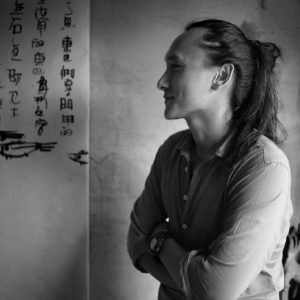
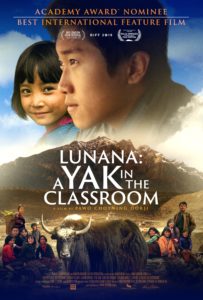
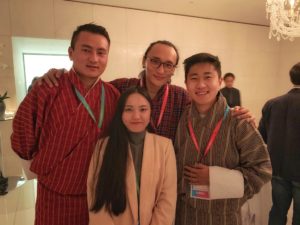
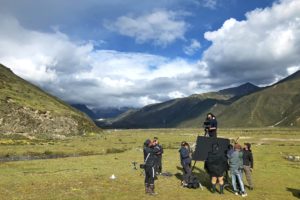
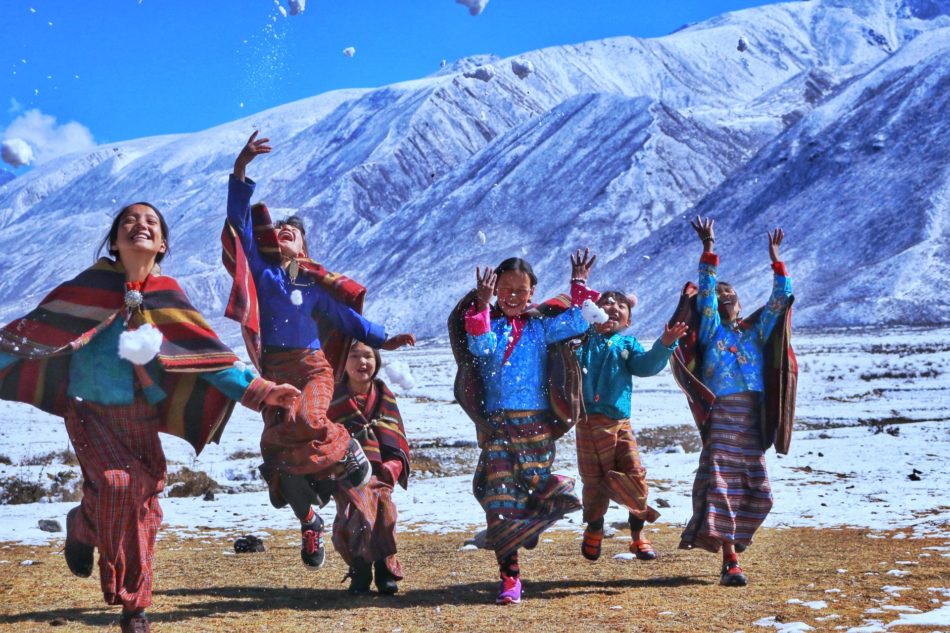
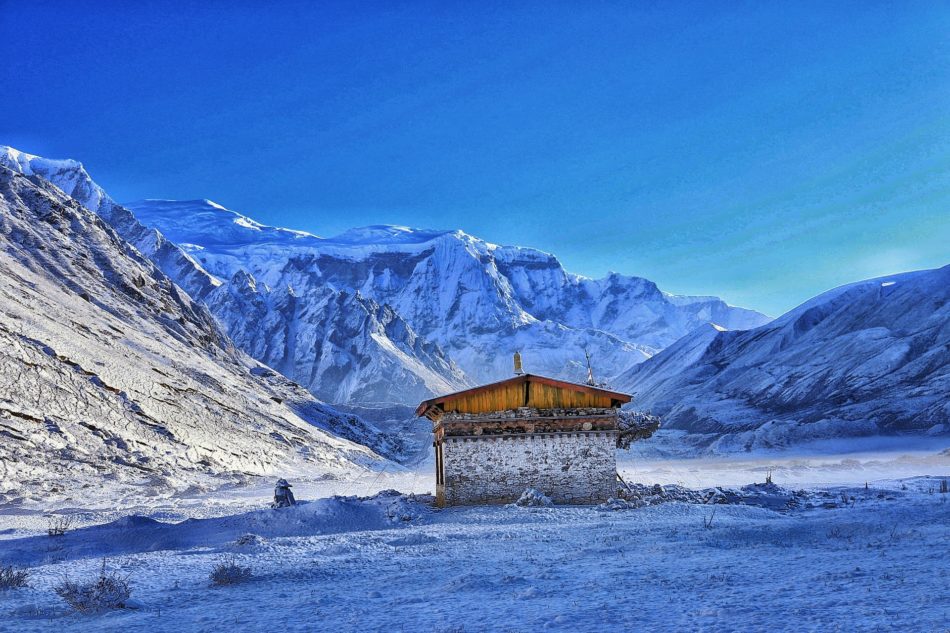
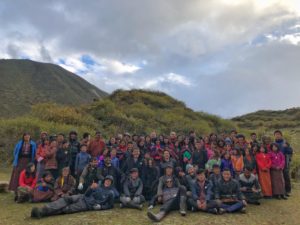
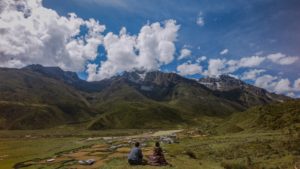
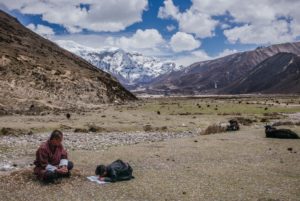
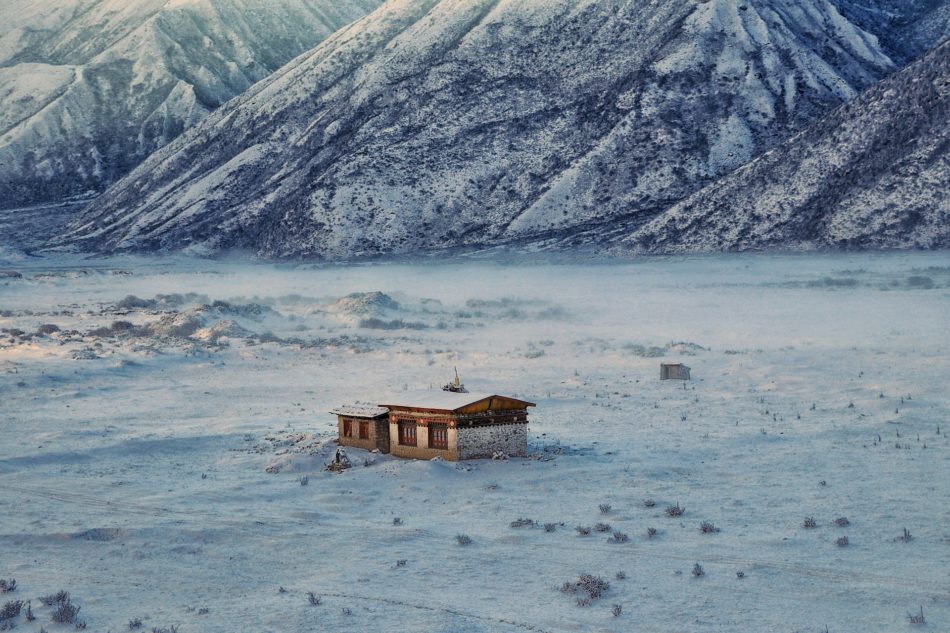






Thank you Teh Chin Laing for yet another great interview. Thank you special for covering Bhutan through Mr Pawo and his Oscar nominated movie Lunana: A yak in the classroom. Your interview is always intriguing and insightful. Look forward to reading your forthcoming articles
Dorji Dhradhul
Director General
Tourism council of Bhutan
Wonderful story and storytelling, Teh Chin Laing. A tale well told. “it is just “us”, we are all one.” Yes! Thank you!
Daniel Will-Harris
http://www.WriteInTheNow.com
This is a very interesting interview and fascinating story from a country I have wanted to visit in the past but never had an opportunity to do so.
congratulations on the film maker on getting nominated for the Oscar’s and almost winning too.
The film itself will become an historical record in the future as the world changes. In a sence a documentary on that isolated region of Bhutan.
it would be nice if the film had a wider cinema release especially in Asian region and Australia.
I look forward to watching this film
Looking Fw to watch this Movie
First of all, I enjoyed reading the interview – I would definitely check the movie after this, it does give me the idea that less road travelled is definitely worth going through. Thus I respect on the projection of this movie. Beside the scenic of the blue skies and wide open space. My kinda life – I dont mind teaching there. Again great story teller from the director, and great interview by Mr. Teh.